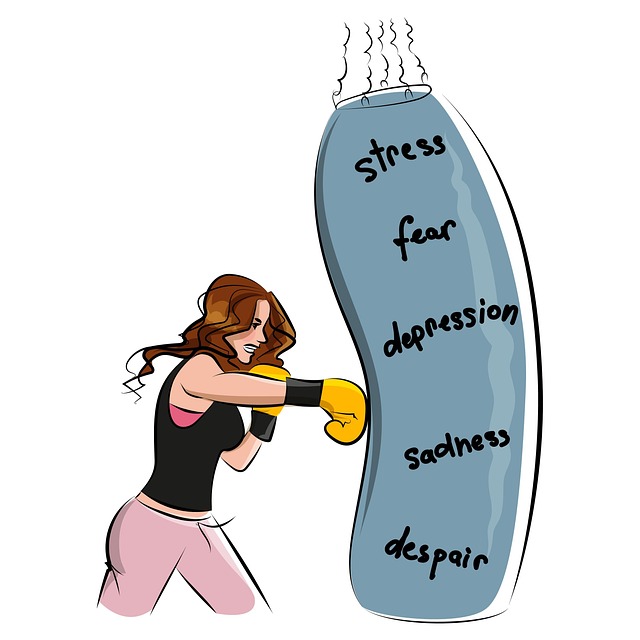Englewood Exposure and Response Prevention (EERP) Therapy is an evidence-based cognitive behavior therapy that combines exposure therapy with response prevention to help individuals safely confront and overcome stress, anxiety, and panic disorders. By gradually exposing clients to their fears, therapists enable them to replace harmful patterns with adaptive behaviors, enhancing self-care practices and social skills for improved mental wellness. EERP is particularly effective in educational settings, teaching students healthier stress management techniques that reduce anxiety, depression symptoms, and foster better emotional regulation skills.
“Stress management is a vital skill, especially in today’s fast-paced world. This article explores an effective approach called Englewood Exposure and Response Prevention Therapy (EERP) as a powerful tool for combating stress and anxiety. We’ll delve into the core principles of EERP, providing practical techniques to manage stress effectively. By understanding how EERP works, educators can guide students in overcoming fears and developing resilience. This comprehensive guide aims to empower individuals with the knowledge and skills to navigate stressful situations, promoting overall well-being.”
- Understanding Englewood Exposure and Response Prevention Therapy (EERP)
- Implementing EERP Techniques for Stress Management
- Benefits and Real-World Applications of EERP in Teaching Stress Management
Understanding Englewood Exposure and Response Prevention Therapy (EERP)

Englewood Exposure and Response Prevention Therapy (EERP) is a highly effective form of cognitive behavior therapy (CBT) designed to help individuals manage stress, anxiety, and panic disorders. This innovative approach combines exposure therapy with response prevention techniques, enabling clients to confront and overcome their fears in a safe environment. EERP facilitates a deep understanding of the mind’s response to stressful situations, allowing individuals to break free from harmful patterns.
The therapy involves gradually exposing clients to stressors or anxiety-provoking scenarios, teaching them new coping mechanisms and responses. By preventing habitual reactions and replacing them with more adaptive behaviors, EERP empowers people to take control of their emotional well-being. This technique has gained prominence in the Mental Wellness Podcast Series Production and Public Awareness Campaigns Development circles due to its success in promoting emotional well-being through practical, evidence-based techniques. Through EERP, individuals can learn to manage stress effectively, leading to improved overall mental wellness.
Implementing EERP Techniques for Stress Management

Englewood Exposure and Response Prevention (EERP) Therapy offers a powerful approach to stress management by helping individuals confront and overcome their fears and anxiety triggers. This evidence-based technique is particularly effective in treating various forms of stress, phobias, and obsessive-compulsive disorders. By gradually exposing clients to stressful situations or objects, therapists enable them to develop healthier responses, replacing negative or harmful behaviors with more adaptive coping strategies.
EERP not only equips individuals with practical tools for managing stress but also fosters self-care practices and enhances social skills. Through guided exposure exercises, participants learn to navigate challenging scenarios, build resilience, and reduce the impact of stressful stimuli on their daily lives. This personalized therapy can be tailored to meet diverse needs, making it a valuable asset in promoting mental well-being and overall quality of life.
Benefits and Real-World Applications of EERP in Teaching Stress Management

Englewood Exposure and Response Prevention (EERP) Therapy is a highly effective technique for teaching stress management, offering numerous benefits in real-world educational settings. By systematically exposing individuals to stressful situations and preventing typical coping responses, EERP helps students develop healthier ways of managing stress. This evidence-based approach has proven successful in reducing anxiety and depression symptoms among students, fostering better emotional regulation skills.
In the classroom, EERP can be integrated into lessons on conflict resolution techniques, promoting positive interactions and enhancing social awareness. Public awareness campaigns development centered around mental health can also benefit from this therapy’s ability to equip students with practical tools for stress reduction. These applications not only contribute to a more supportive learning environment but also lay a solid foundation for preventing issues like depression among young individuals.
Englewood Exposure and Response Prevention (EERP) Therapy offers a powerful framework for teaching effective stress management. By understanding the connection between thoughts, feelings, and behaviors, individuals can learn to challenge negative thought patterns and replace them with healthier responses. EERP’s practical techniques have wide-ranging benefits in various settings, especially education, where it empowers students to manage stress, improve well-being, and enhance overall learning experiences. This evidence-based approach provides a valuable tool for educators aiming to foster resilient and mentally healthy environments.














